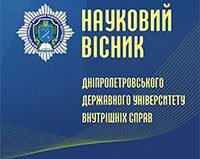Nataliia KOMYKH
KOMYKH N. (2023), THE BLOGOSPHERE AS AN ACTOR IN THE COMMUNICATION FIELD OF WAR: THE PHENOMENON OF BLURRED EXPERTISE; Scientific Bulletin of Dnipropetrovsk State University of Internal Affairs, № 2, 82-89
DOI: 10.31733/2078-3566-2023-2-82-89
ABSTRACT. The article examines the conceptual foundations and features of the development of the blogosphere in Ukrainian society in the conditions of a full-scale invasion of the invader into the territory of the Ukrainian state. In particular, attention is focused on the problem of the erosion of expertise in the structure of blogger content and the phenomenon of disinformation, as a latent function implemented by the blogger environment and contributing to the inadequate formation of public opinion of content consumers. A complex, constructivist approach is proposed as a theoretical and methodological basis for the study of the blogosphere. Within the framework of the mentioned approach, the types of blogs, the structures of blogs, and the explicit and latent functions of the blogosphere are considered. The problem of misinformation and erosion of expert knowledge is illustrated by the results of public opinion polls. It is noted that in the conditions of war, the consumption of information through the Internet – social networks increases. The urban population is more active than the rural population.
The blogosphere is an active communicative environment for the reproduction of information. The traditional expertise of representatives of certain fields of knowledge and practice is losing popularity, and instead, the more relevant opinions and advice of bloggers who are not specialists in the field they cover. The blogosphere combines these two expert environments, thereby forming a certain information culture, which is a weapon in the information war. In such a situation, the task of content consumers is to learn to recognize true information and prevent the spread of disinformation. On the other hand, the Internet provides an opportunity for an individual to realize himself, to find his audience, and to exercise the right to freedom of speech. A new concept is emerging – an expert/opinion leader. The expertise of such a leader is determined by the number of subscribers, and this is one of the criteria on which trust in the content consumer expert is based. The blogosphere forms a new quality of expert environment and knowledge, an alternative way of mass communication and interpersonal communication in particular.
Keywords: blog, blogospheres, digital society, blurred expertise, expert, misinformation.
- References:
- Korystuvannia internetom sered ukraintsiv: rezultaty telefonnoho opytuvannia, provedenoho 13-18 travnia 2022 roku [Internet use among Ukrainians: results of a telephone survey conducted on May 13-18, 2022]. Kyivskyi mizhnarodnyi instytut sotsiolohii. URL: https://www.kiis.com.ua/?lang=ukr&cat=reports&id=1115&page=1. [in Ukr.].
- Mytko, A. M. (2014) Informatsiina demokratiia: realii ta vyklyky chasu [Information democracy: realities and challenges of the time] : monohrafiia. Lutsk : Vezha-druk. 400 р. [in Ukr.].
- Ukrainski media, stavlennia ta dovira u 2022 r. [Ukrainian media, attitude and trust in 2022]. Internews. URL: https://internews.in.ua/wp-content/uploads/2022/11/Ukrainski-media-stavlennia ta-dovira-2022.pdf. [in Ukr.].
- Blood, R. Weblogs: a history and perspective. URL: http://www.rebeccablood.net/essays/weblog_history.html.
- Lomborg, S. (2009) Navigating the blogosphere: Towards a genre-based typology of weblogs. First Monday. Vol. 14. No. 5. URL: https://firstmonday.org/ojs/index.php/fm/article/view/2329/2178.
- Nichols, T. (2017) The death of expertise: the campaign against established knowledge and why it matters, first edition. Oxford : Oxford University Press. 272 р.
